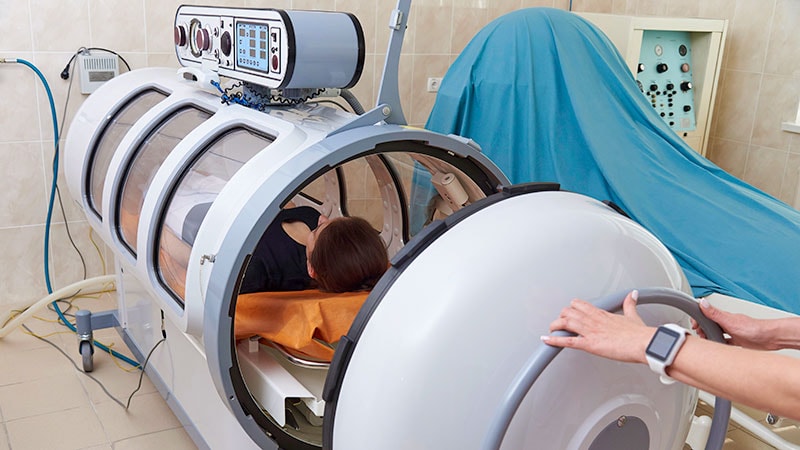Hyperbaric Oxygen Improves Heart Function in Long COVID Patients
Conceitos essenciais
HBOT improves heart function in long COVID patients.
Resumo
The study on hyperbaric oxygen therapy (HBOT) in patients with long COVID revealed promising results in improving heart function. Here are the key highlights and insights from the content:
- HBOT increased markers of heart function in a small randomized, controlled trial of long COVID patients.
- Patients with reduced left ventricular global longitudinal strain (GLS) at baseline showed a significant increase in GLS after receiving HBOT.
- GLS is a measure of systolic function and a predictor of heart failure-related outcomes.
- Global work efficiency (GWE) and the global work index (GWI) also increased in HBOT-treated patients.
- HBOT has been effective in treating diabetic foot ulcers, decompression sickness, and cognitive impairment after stroke.
- The study suggests evaluating post-COVID syndrome patients with echocardiography and GLS to determine the potential benefits of HBOT.
- The clinical relevance of the study's findings remains unclear, and further research is needed to establish the optimal treatment protocol.
Personalizar Resumo
Reescrever com IA
Gerar Citações
Traduzir Fonte
Para outro idioma
Gerar Mapa Mental
do conteúdo fonte
Visitar Fonte
www.medscape.com
Hyperbaric Oxygen May Improve Heart Function in Long COVID
Estatísticas
"GLS increased significantly from –17.8% at baseline to –20.2% after HBOT."
"GWE increased overall after HBOT from 96.3 to 97.1."
Citações
"HBOT is an effective treatment for diabetic foot ulcers, decompression sickness in divers, and other conditions, such as cognitive impairment after stroke." - Marina Leitman, MD
"We should open our minds to thinking about this treatment for another indication." - Marina Leitman, MD
Principais Insights Extraídos De
by Marilynn Lar... às www.medscape.com 05-15-2023
https://www.medscape.com/viewarticle/991971
Perguntas Mais Profundas
How does the potential of HBOT in improving heart function in long COVID patients impact the broader landscape of COVID-19 treatment?
The potential of Hyperbaric Oxygen Therapy (HBOT) in improving heart function in long COVID patients could have significant implications for the broader landscape of COVID-19 treatment. If further research confirms the effectiveness of HBOT in addressing cardiac issues associated with long COVID, it could open up a new avenue for managing post-COVID complications. This could lead to the development of targeted treatment protocols for individuals experiencing persistent symptoms after recovering from COVID-19, potentially improving their quality of life and long-term outcomes. Additionally, the incorporation of HBOT into the treatment arsenal for long COVID may contribute to a more comprehensive approach to managing the diverse manifestations of the disease.
What are the limitations and risks associated with using HBOT as a treatment for long COVID patients?
While the study on HBOT in long COVID patients shows promising results, there are limitations and risks associated with using HBOT as a treatment for this population. One limitation is the need for further research to establish the optimal number of HBOT sessions and the long-term effects of the treatment. Additionally, the high cost of HBOT and the potential for side effects and risks, although minimal, need to be considered. Some individuals may not have access to HBOT facilities, limiting its widespread applicability. Moreover, the mechanism of action of HBOT in addressing long COVID symptoms is not yet fully understood, highlighting the need for more studies to elucidate its efficacy and safety profile in this context.
How can the findings of this study on HBOT be applied to other chronic conditions beyond COVID-19?
The findings of the study on HBOT in long COVID patients may have implications for the management of other chronic conditions beyond COVID-19. The positive impact of HBOT on heart function, as demonstrated in the study, suggests that HBOT could potentially benefit individuals with cardiac issues in various clinical settings. By exploring the application of HBOT in conditions such as heart failure, diabetic foot ulcers, and cognitive impairment after stroke, healthcare providers may uncover new treatment avenues for improving patient outcomes. The study's emphasis on precision medicine and the evaluation of specific parameters like global longitudinal strain (GLS) could inspire similar tailored approaches in the treatment of other chronic diseases, leading to more personalized and effective interventions.
0
